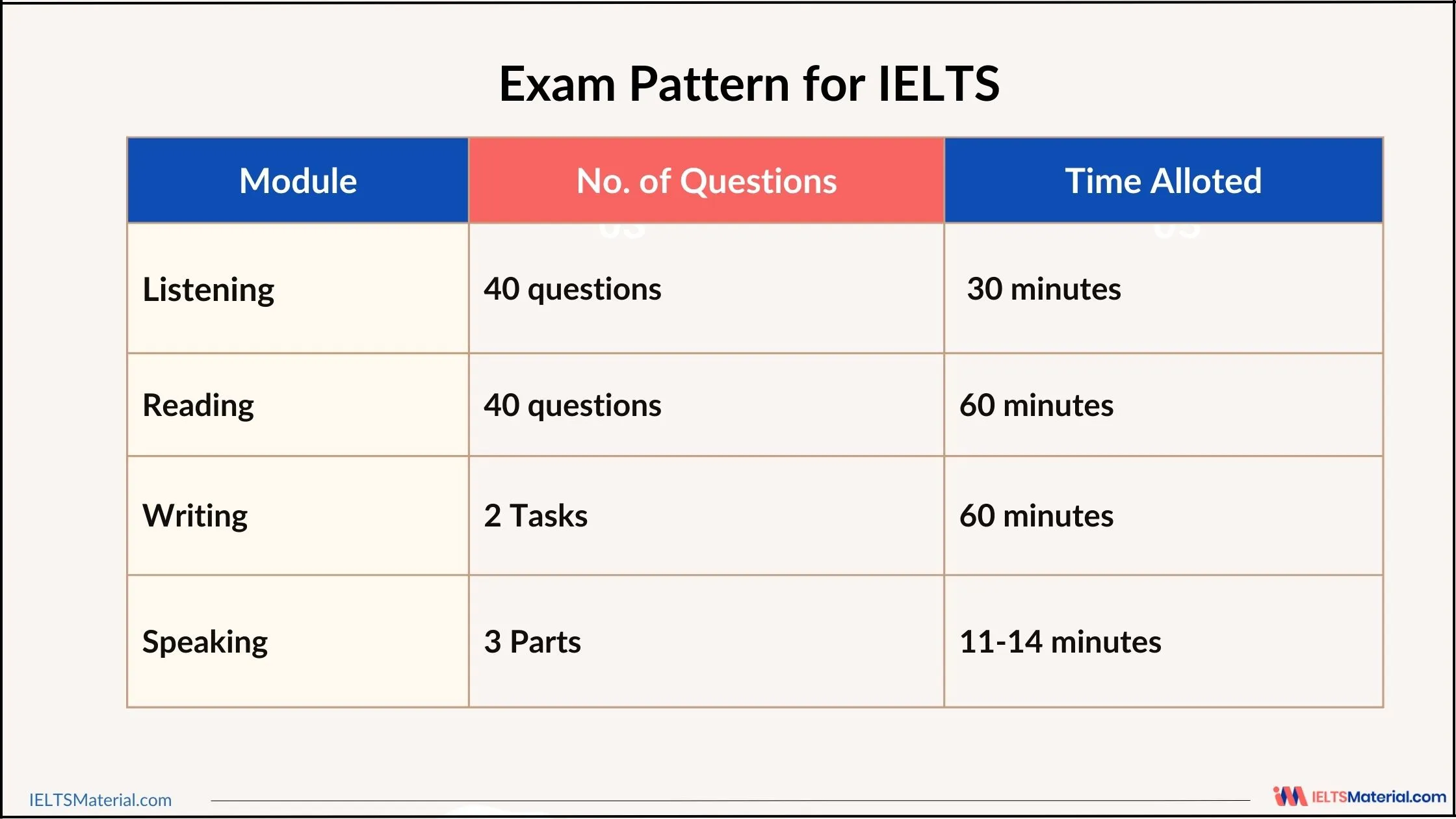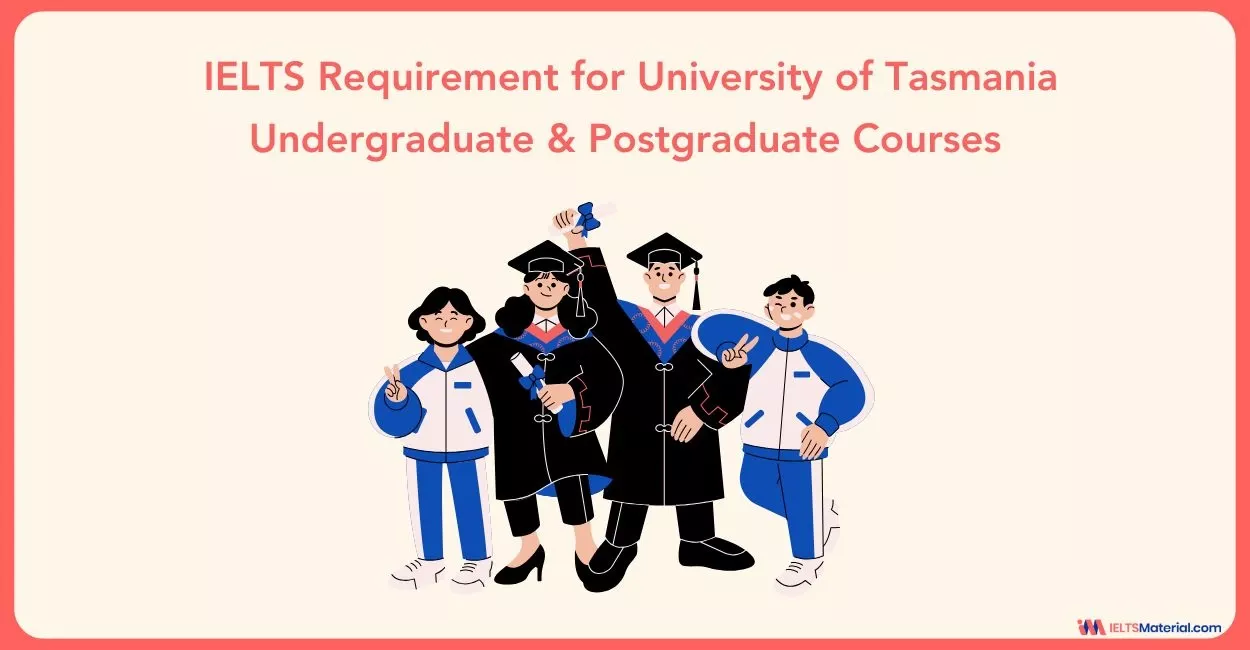IELTS Exam Pattern 2025: Section-Wise Format & Exam Breakdown
Wondering what to expect in the IELTS test? This guide explains the IELTS exam pattern for Academic and General Training exams, helping you prepare with confidence!
Table of Contents

Limited-Time Offer : Access a FREE 10-Day IELTS Study Plan!
Are you preparing for the IELTS exam? Understanding the test format is the first step to success! The IELTS exam is divided into four sections—Listening, Reading, Writing, and Speaking—each designed to assess your English skills for study, work, or immigration. In this blog, we’ll break down the test format for both IELTS Academic and IELTS General Training, so you know exactly what to expect. Let’s dive in!
IELTS Exam Pattern: An Overview
The IELTS exam evaluates four essential language skills—Listening, Reading, Writing, and Speaking—across two test formats:
- IELTS Academic – For students applying to undergraduate and postgraduate programs at universities worldwide.
- IELTS General Training – For individuals migrating to an English-speaking country or relocating for work-related purposes.
Both formats can be taken as a computer-based IELTS exam or IELTS pen and paper test. Before starting your IELTS 2024 preparation, understanding the exam pattern and syllabus is crucial. Let’s dive into the details of each section!
IELTS Exam Structure and Syllabus
Candidates should also have a thorough understanding of the IELTS syllabus in order to be able to analyze the IELTS test pattern properly.

IELTS Exam Syllabus
A clear understanding of the IELTS syllabus is essential for analyzing the exam pattern effectively. The total test duration is 2 hours and 45 minutes, covering four sections:
1. IELTS Listening (30 minutes)
- Consists of four parts, each with 10 questions (total: 40 questions).
- In the paper-based IELTS, candidates get an extra 10 minutes to transfer answers.
2. IELTS Reading (60 minutes)
- Includes 40 questions, but the content varies:
- IELTS Academic Features academic passages.
- IELTS General Training Contains texts of general interest from newspapers, advertisements, and magazines.
3. IELTS Writing (60 minutes)
- IELTS Writing Task 1:
- Academic: Summarize a graph, table, chart, or process in 150 words.
- IELTS General Writing Task 1: Write a letter (formal, semi-formal, or informal).
- IELTS Writing Task 2: Write an essay of at least 250 words for both formats.
4. IELTS Speaking (11–14 minutes)
- A face-to-face interview assessing fluency, coherence, and pronunciation. It includes three parts:
- IELTS Speaking Part 1: General questions on familiar topics (work, studies, hobbies).
- IELTS Speaking Part 2: Speak for 1–2 minutes on a cue card topic.
- IELTS Speaking Part 3: Discussion on the Part 2 topic with deeper questions.
The format is the same for both Academic and General Training.
Important Notes:
- Listening, Reading, and Writing are conducted on the same day without breaks.
- Speaking may be scheduled 7 days before or after the main test or on the same day.
- The IELTS band score ranges from 0–9, with raw scores converted into scaled scores.
- The IELTS score validity is valid for 2 years from the test date.
- Understanding this structure will help you prepare efficiently. Let’s explore each section in detail!
Join our free IELTS webinars to explore a step-by-step guide to crafting a Band 8+ answer!
IELTS Test Pattern: Section-Wise Breakdown
A clear understanding of the IELTS test format is essential for effective preparation. The exam consists of four sections—Listening, Reading, Writing, and Speaking—which assess different language skills.
1. Listening (30 minutes)
The Listening section is the same for both Academic and General Training tests. It includes four recordings, each followed by 10 questions (total: 40 questions).
- Recording 1: A conversation in a social context (e.g., booking a hotel).
- Recording 2: A monologue on a general topic (e.g., a talk about local services).
- Recording 3: A conversation among up to four people in an educational/training context.
- Recording 4: A monologue on an academic subject (e.g., a lecture).
Key Points:
- Recordings are played only once and include various accents (British, Australian, New Zealand, North American).
- Each correct answer earns 1 mark, converted into a band score (0–9).
- Incorrect spelling or grammar results in lost marks.
Question Types in IELTS Listening
- Multiple Choice Questions
- Table/Note Completion
- Sentence Completion
- Summary Completion
- Labeling a Diagram/Map/Plan
- Matching Questions
- Short Answer Questions
Tip: Make use of the IELTS Listening practice tests to familiarise with the above-mentioned question types and improve listening skills.
2. Reading (60 minutes)
The Reading section assesses various skills, such as skimming, scanning, understanding arguments, and recognizing opinions. It contains 40 questions, with one mark per correct answer.
Academic Reading
- Consists of three long passages from books, journals, and newspapers.
- Topics range from descriptive and factual to discursive and analytical.
General Training Reading
- Extracts come from notices, advertisements, company handbooks, and newspapers—real-life texts commonly found in English-speaking environments.
- Sections:
- Section 1: Two or three short factual texts.
- Section 2: Two work-related texts.
- Section 3: One longer passage on a general-interest topic.
Question Types in IELTS Reading
- Multiple Choice Questions
- Matching Sentence Endings
- True/False/Not Given Questions
- Matching Headings
- Matching Information
- Matching Features
- Short-answer Questions
- Diagram Completion
- Yes/No/Not given Questions
- Summary Completion
- Sentence Completion
Tip: Regular IELTS Reading practice tests enhance comprehension and speed.
3. Writing (60 minutes)
The Writing section consists of two tasks, with Task 1 differing between Academic and General Training, while Task 2 is the same for both. Answers must be in a formal style.
Academic Writing
- Task 1: Describe a graph, table, chart, or diagram in 150 words.
- Task 2: Write a 250-word essay in response to a problem, argument, or opinion.
General Training Writing
- Task 1: Write a letter (formal, semi-formal, or informal).
- Task 2: Write a 250-word essay, which may allow a more personal writing style.
Tip: Regular IELTS Writing practice tests is essential for improving structure and coherence.
4. Speaking (11–14 minutes)
A face-to-face interview that tests fluency, coherence, vocabulary, and pronunciation. The format is the same for both Academic and General Training.
Parts of the IELTS Speaking Test
- Part 1 (Introduction & Interview): Questions about yourself, work, studies, and hobbies (4–5 minutes).
- Part 2 (Cue Card/Long Turn): Speak for 1–2 minutes on a given topic after 1-minute preparation.
- Part 3 (Discussion): In-depth discussion on the Part 2 topic, exploring abstract ideas (4–5 minutes).
Tip: Practicing IELTS Speaking tests helps improve confidence and fluency.
Overall, the IELTS Academic test evaluates readiness for higher education, while the General Training test assesses English skills for everyday and workplace situations. To boost your IELTS score, Familiarize yourself with the test format and Practice with sample questions and full-length mock tests.
Join IELTS online classes for expert guidance and strategies to achieve your target IELTS band score!
Useful Resources
Learn everything about IELTS

Start Preparing for IELTS: Get Your 10-Day Study Plan Today!
Explore other Writing Task 1 Articles
Recent Articles

Kasturika Samanta











Post your Comments